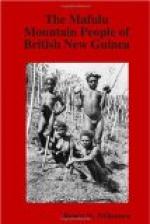On the death of an owner everything he possesses goes, except as above mentioned, to his sons. They divide the movable things between them, but the bush and garden land pass to them jointly, and there is no process by which either of these can be divided and portioned among them. The male children of a deceased son, and the male children of any deceased male child of that deceased son (and so on for subsequent generations), inherit between them in lieu of that son. There does not appear, however, to be any idea in the Mafulu mind of each son of the deceased owner being entitled to a specific equal fractional share, or of the descendants of a deceased son of that owner being between them only entitled to one share, per stirpes. They apparently do not get beyond the general idea that these people, whoever they may be and to whatever generations they may belong, become the owners of the property.
They take possession of and cultivate the existing gardens as joint property. Any one of them will be allowed to clear some of their portion of bush, and fence it, and plant it as a garden, and it will then become the sole property of that one man, and if he dies it will pass as his own property to his own heirs; though, as before stated, if he abandons it, and lets it be swallowed up by the bush, it will cease to be his own garden, and will again be included in the family’s joint portion of bush land, and on his death his heirs will only come into the joint bush ownership.
In this way the ownership of a garden must often be in several persons, with no well-defined rights inter se, and the general ownership of bush land which has never been cleared, or which, having been cleared, has been abandoned and reverted, must often be in a very large number of persons without defined rights. In fact, so far as bush land is concerned, one only has to remember that on the death of an owner it passes into joint ownership of children—that on the deaths of these children fresh groups of persons come into the joint ownership—that this may go on indefinitely, generation after generation—that bush, having once got into the ownership of many people, is hardly likely to again fall by descents into a single ownership—that indeed the tendency must be for the number of owners of any one portion of bush steadily to increase—and finally that there is no way by which the extensively divided ownership can be terminated by either partition or alienation—and one then realises the extraordinary complications of family ownership of bush land which must commonly exist.




